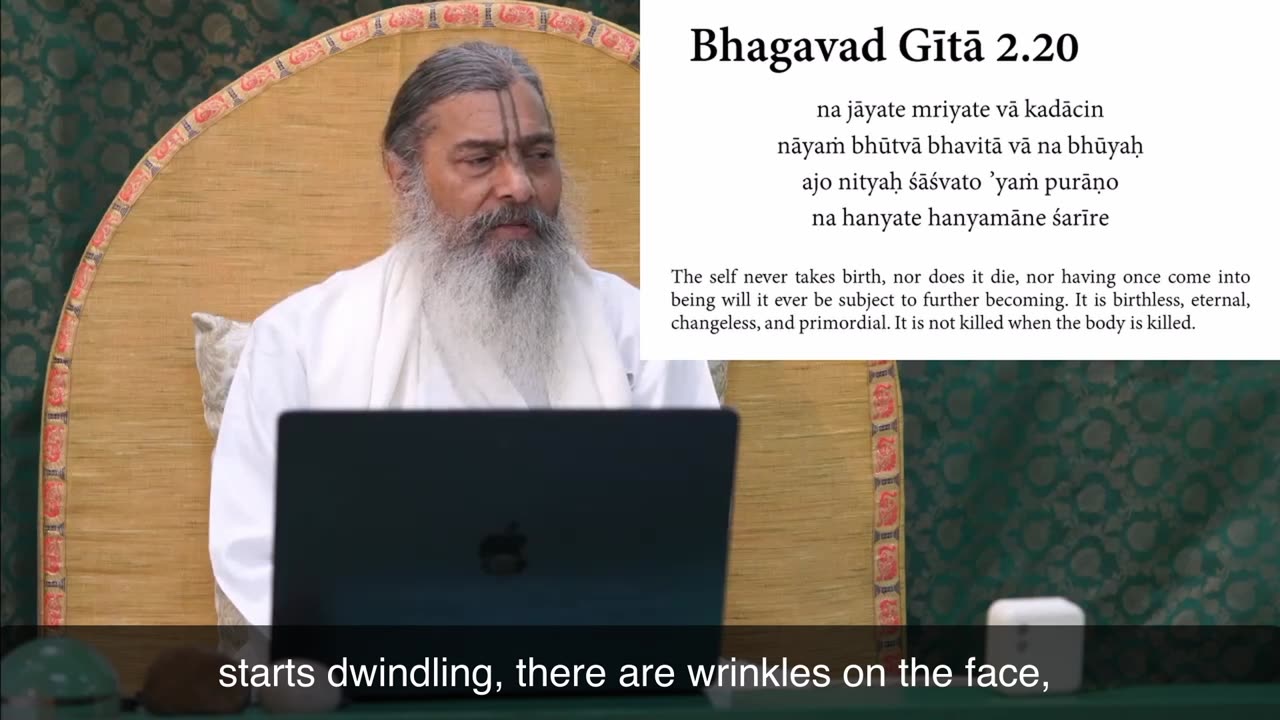Premium Only Content

Satyanarayana Das Babaji ⎹ Bhagavad-Gītā 2.20 ⎹ The Unchanging Experiencer of the Changing Body
More videos like this, see my you tube channel:
https://www.youtube.com/@dayanidhi9391
The uniqueness of Vedic scriptures like the Bhagavad-Gītā is that they give us knowledge about the ātmā. The ātmā is the unchanging conscious experiencer of the body, and of the changes the body undergoes, starting with birth and ending with death. The Gītā tells us that the ātmā, which is completely different in nature from ever-changing body and mind, is who you really are.
The six changes the body undergoes are:
1. Jāyate (birth).
2. Asti (existence).
3. Vardhati (growth).
4. Vipariṇāmate (maturation).
5. Apakṣiyate (decay).
6. Nāsyati (destruction, death).
But the ātmā, being completely nonmaterial, is beyond these changes, and therefore unaffected by them.
Bhagavad-Gītā 2.20:
Meaning of each word:
ayam — this [ātmā]; na kadācit — never; jāyate — takes birth; vā — or; mriyate — dies; bhūtvā vā — or having come into being; na bhavitā — it will not become; bhūyaḥ — again; ayam — this [ātmā]; ajaḥ — [is] birthless; nityaḥ — eternal; śāśvataḥ — changeless; purāṇaḥ — [and] primordial; hanyamāne — on the destruction; śarīre — of the body; na hanyate — [the ātmā] is not killed.
Translation:
The self never takes birth, nor does it die, nor having once come into being will it ever be subject to further becoming. It is birthless, eternal, changeless, and primordial. It is not killed when the body is killed.
~~~~~~~~~~~
Source video used for this, from the Jiva Institute of Vedic Studies:
https://youtu.be/biu-dOcnfJU?si=GH1UtrpWOHMDOKLw
-
 LIVE
LIVE
Scottish Viking Gaming
4 hours ago💚Rumble :|: Sunday Funday :|: Smash the Blerps and Vape the Terpes
1,256 watching -
 1:03:32
1:03:32
Winston Marshall
3 days ago"War On Children!" The DEMISE Of The West Starts With Schools - Katharine Birbalsingh
31.8K33 -
 1:45:00
1:45:00
RG_GerkClan
6 hours ago🔴LIVE Sunday Special - It's Time for World Domination - Civilization VII - Gerk Clan
24.9K6 -
 LIVE
LIVE
Major League Fishing
3 days agoLIVE Tackle Warehouse Invitationals, Stop 1, Day 3
252 watching -
 23:34
23:34
marcushouse
7 hours ago $7.83 earnedBREAKING: Starship Launch IMMINENT – But What’s This SURPRISE Flight 9 Plan?! 🚀🔥
41.8K7 -
 8:43
8:43
Film Threat
1 day agoTHE MONKEY | Film Threat Reviews
55.8K2 -
 15:55
15:55
TSPLY
1 day agoThe Media Is Very Afraid Of FBI Director Kash Patel
39K33 -
 6:57
6:57
Cooking with Gruel
20 hours agoMake Cheese Great Again
31.5K12 -
 5:17
5:17
Mrgunsngear
23 hours ago $6.72 earnedPresident Trump Has Appointed A New ATF Director
37.6K31 -
 48:17
48:17
Athlete & Artist Show
8 days ago $1.73 earnedS5E1: Chucky Announces First Kid, 4 Nations Face Off, and more!
37.4K2